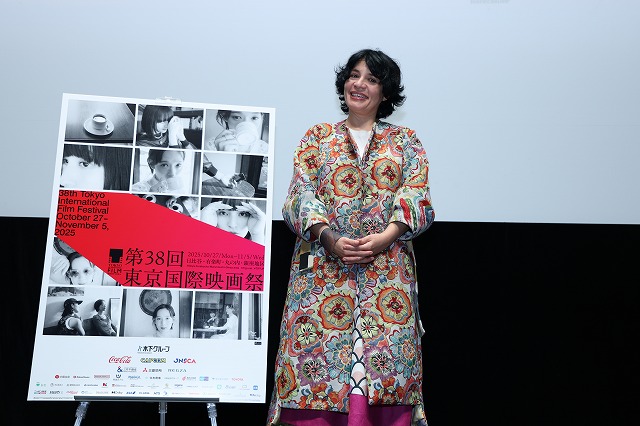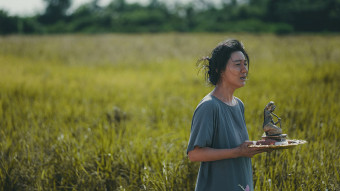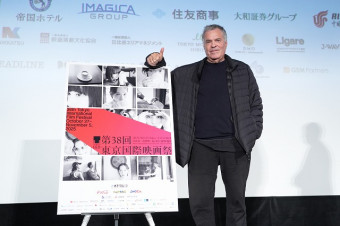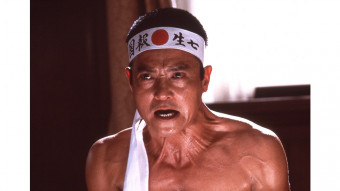
If you’re looking for a lifelong biopic of the late Mother Teresa of Calcutta, who won the Nobel Peace Prize in 1979 and was beatified by the Vatican in 2003, don’t look to the Belgian-North Macedonian film Mother, which had its Asian premiere on November 1 in the Competition section of the 38th Tokyo International Film Festival. Mother only covers seven days in the sainted nun’s life, specifically the week leading up to the Vatican’s decision as to whether she could leave her position as the Mother Superior of the Loreto Sisters order in Calcutta to found the Missionaries of Charity.
Still, as weeks go, those seven days were quite action-packed, though much of the film’s story is either invented or extrapolated from historical materials. For instance, Mother Teresa’s (Noomi Rapace) hand-picked successor for the top job at the convent, should the pope give her the thumbs-up for her charity, is Sister Agnieszka (Sylvia Hoeks), a completely fictitious character. The decision on the part of the three screenwriters to make her a construct is perhaps understandable, since the main conflict in the story is whether Sister Agnieszka should undergo an abortion.
One of those screenwriters and the director of the film, Teona Strugar Mitevska, told the audience during a post-screening Q&A that this wasn’t her first journey into the life of Agnes Gonxha Bojaxhiu, the birth name of Albanian-Indian Mother Teresa, who was born in the Kosovo region of the old Ottoman Empire in 1910.
“That’s very close to where I grew up,” said Mitevska, who now lives in Belgium. Skopje, her hometown, is now a city in North Macedonia. “Some years ago, Macedonian Television asked me to make a documentary about Mother Teresa, and I couldn’t say no.” During her research for the project, Mitevska had access to Mother Teresa’s personal diaries, “in which she discussed her private reservations about her faith in God. We also conducted interviews—this was 15 years ago—with sisters who started the Missionaries of Charity with Mother Teresa, and through their stories I discovered this giant of a woman behind the myth. She was a real rebel, a Robin Hood, a free spirit, and I realized that she has to be presented in the context of the time when she lived, which was 100 years ago. To me, the freedom she lived and advocated made her a punk rocker.”
This outlook surely influenced the musical choices for the score. Though there’s much classical-sounding string music and hymn-singing, some of the more dramatic scenes are set to heavy metal. In one sequence, while Mother Teresa is kneading dough, she hallucinates a little Indian boy who blows flour in her face, setting her off on a nightmare reverie of nuns dancing to ear-splitting guitar shredding.
“Mother Teresa is an internationally known figure,” said Mitevska. “And if you want to know about her you can find her biography on Wikipedia, but I wasn’t interested in the saint she became. I wanted to speak about the real woman behind the image. So narrowing down the scope of the movie to those seven days was a deliberate choice. It was 1948, the end of British rule of the Indian subcontinent, the time of the great famine, the partition. It was the pivotal moment in Mother Teresa’s life. Frankly, as a filmmaker, I love that kind of constraint, since it helps me add dramatic tension that drives the audience through the story. Historical characters become more intense.”
For sure, the lead character, as played by internationally known Swedish actor Noomi Rapace ‘who is very punk rock,’ according to Mitevska, is not your mother’s Mother Teresa. This Mother Teresa is toweringly ambitious, domineering to the other nuns in her order, including those who are older than her, and fiercely protective of Catholic dogma even as she prepares to leave the convent. In one of the most bizarre scenes, she argues with her superior, Father Frederick, about whether or not abortion is a sin in the eyes of God, something she is sure about but which the priest isn’t. In fact, he thinks that “abandoning Sister Agnieszka” whose real name is Sara and took her vows in order to avoid being sent to a Nazi concentration camp, is the real sin.
“Mother Teresa was audacious, powerful, and brave,” said Mitevska. “She was also disarmingly human.” When someone asked about the scene with the Indian boy, Mitevska said, “That child represents temptation. Maybe she would like to be a real mother, as she says at one point. But she puts her ambitions ahead of that.”
This insistence that Mother Teresa be approached as a woman came to a head during the Q&A when Mitevska asked the moderator, TIFF Programming Director Ichiyama Shozo, to choose a female interlocutor after having selected three men. The woman he chose asked Mitevska what it means for her to be a woman and a mother.
“I’m a mother to my son, but I’m also a mother to my actors and crew,” she said. “I care about the world and about humanity deeply. I love being a woman, but being a woman in our industry is not easy, though it’s easier than it was 25 years ago. I just turned 50 and it’s taken me this long to develop the audacity and the courage of your average 18-year-old boy. It’s taken us this long to be who we really are. I guess it means that being a mother is love.”
Q&A Session: Competition
Mother
Guests: Teona Strugar Mitevska (Director/Screenplay)



























































